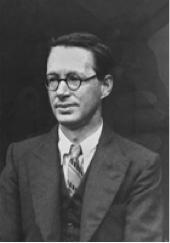 If ever there was an “Anglicised Scotsman”, this was the man! Despite growing up on the remote Scottish island of Wyre, in the Orkneys, Muir had no time for Scottish Nationalism and preferred to write in plain English. His poetry has been described as written in “a calm and neutral tone”. He enraged some of the Scottish literati in 1936 with his published work Scott and Scotland. In this he made it clear that the Scots could only truly create great literature if they wrote using pure English language (presumably travelling as far from the Burns style of writing as possible). The so-called Lallans movement of the time, led by Hugh MacDiarmid, were not impressed by Muir’s attitude.
If ever there was an “Anglicised Scotsman”, this was the man! Despite growing up on the remote Scottish island of Wyre, in the Orkneys, Muir had no time for Scottish Nationalism and preferred to write in plain English. His poetry has been described as written in “a calm and neutral tone”. He enraged some of the Scottish literati in 1936 with his published work Scott and Scotland. In this he made it clear that the Scots could only truly create great literature if they wrote using pure English language (presumably travelling as far from the Burns style of writing as possible). The so-called Lallans movement of the time, led by Hugh MacDiarmid, were not impressed by Muir’s attitude.
Edwin Muir came into this world in 1887 and his early life was happily spent on the Orcadian family farm, and he really did see this place as the closest you can get to Eden. All of this came to a sad end though in the first few years of the 20th century. In 1901 the farm was lost and his father moved them all to Glasgow. This was, without a doubt, a traumatic experience for the whole family and, tragically they died one by one in rapid succession. First his father, brothers then his mother passed away leaving the young man seriously depressed. The loss of his family was enough of a blow for anyone, but to find yourself in a hostile, alien environment such as Glasgow was at that time, was almost too much for him to bear.
Reviewers of his work have since said that those depressing years (working in factories that made charcoal out of bones was a shocking example) helped to shape the poet and the man in equal measures. He was psychologically damaged, no doubt, but he somehow climbed out of the pit and meeting the woman that he was to marry was a great boost to him. He and Willa Anderson married in 1919 and promptly transferred to London and, later, the two of them collaborated on translations of German literature that was originally penned by the likes of Franz Kafka and Gerhart Hauptmann
A short period of European travel followed, lasting two years from 1921 until 1923. He spent time in Italy, Salzburg, Dresden, Vienna and Prague and, on returning to England, he busied himself with 7 collections of poetry and three novels. His fame as a writer was spreading and he returned to Scotland in 1935, publishing the highly controversial work mentioned above – Scott and Scotland.
An interesting quote from Muir’s diaries during the period 1937-39 throws light on his state of mind at the time. He saw himself as something of a time traveller. Perhaps the problem was that he never really knew where he was supposed to be. Here is the extract:

Between 1946 and 1955 he filled a number of high profile posts such as Director of the British Council for Rome and Prague and at Newbattle Abbey College he became warden. It was at this college set up specifically for the further education of men of the working class that he met George Mackay Brown, a fellow Orcadian poet. His final major achievement was to be at Harvard University as Professor of English in 1955 but it was home to England a year later.
Perhaps a poem that sums up how he felt about the country in which he grew up, and the people of that country, was Scotland 1941 and here are two verses from it:

Edwin Muir died in 1959 aged 72 while living in Swaffham Prior, Cambridge. A commemorative bench was erected three years later in the village district of Swanston, near Edinburgh. He was obviously fondly remembered there following time spent in the village in the 1950s.

